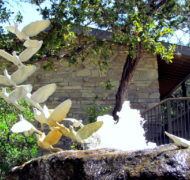Parable of the Sower
Daily Reflection / Produced by The High Calling
And he told them many things in parables, saying: “A sower went out to sow. And as he sowed, some seeds fell along the path, and the birds came and devoured them. Other seeds fell on rocky ground, where they did not have much soil, and immediately they sprang up, since they had no depth of soil, but when the sun rose they were scorched. And since they had no root, they withered away. Other seeds fell among thorns, and the thorns grew up and choked them. Other seeds fell on good soil and produced grain, some a hundredfold, some sixty, some thirty. He who has ears, let him hear.”
Matthew 13:3-9
Lent is the season of dirt, a dusty and ashen interlude between Epiphany and Easter. So it’s appropriate to consider The Parable of the Sower… a story that, whatever else it may be, is about dirt. It’s no surprise that Jesus is once again dealing with dirt. God seems to have an agrarian bent evidenced from the time he “planted a garden in Eden, in the east.”
Jesus tells the story of seeds sown on four different types of dirt, leading to four different outcomes (three of which seem undesirable, to say the least). In each case, the ultimate outcome can be traced back to the condition of the soil onto which the seed fell. At Laity Lodge, and throughout the Texas Hill Country, the soil leaves something to be desired. At most it’s a couple of inches deep. Around the Lodge there are even places where there is no soil to speak of at all.
What type of soil do you have?
Or, what kind of heart do you have? Are gospel seeds able to take root? And if so, are they able to endure? When the sun scorches (and it certainly does around here), do they survive? And having survived, is grain produced? Lent is the season for questions such as these. And if our soil and our hearts are rocky or weedy or compacted with birds overhead, we are not to despair.
In John we read that Mary, upon arriving at the empty tomb, mistakes the risen Jesus for “the gardener.” Maybe it was no accident. Norman Wirzba, a recent Laity Lodge retreat speaker, has suggested that Jesus is “the gardener who came to clean up his garden and lead it into abundant and fruitful life.” And a good gardener such as this knows to start with the soil.
QUESTIONS FOR REFLECTION: What kind of soil do you find where you live? Using the types from the parable, how would you describe the soil of your heart?
PRAYER: God, give us ears to hear. And nurture our hearts’ soil, that we might produce grain for you. Amen.






